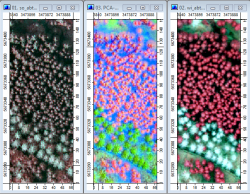Exercise: Estimating top height of a forest stand by airborne laser scanning (ALS)
(→Displaying digital orthophotos) |
(→Displaying digital orthophotos) |
||
| Line 4: | Line 4: | ||
==Displaying digital orthophotos== | ==Displaying digital orthophotos== | ||
| − | + | [[Image:Dop_so_PCA_wi.png.png|250px|thumb|right|'''Figure A''': Digital orthophotos (DOP): left: summer (RGB=432), right winter (RGB=432), middle first three components of PCA of 8 bands of DOP summer and winter.]] | |
# Start SAGA GIS {{mitem|text=Start --> All Programs --> OSGeo4W --> SAGA GIS}}. If you do not find this link start the windows explorer, navigate to the folder 'C:\OSGeo4W\apps\saga'. Copy the file [[file:QGIS_2.0_saga.png|25px]] 'saga_gui.exe' and paste as a link on the desktop. Double click on the link symbol to start SAGA GIS. | # Start SAGA GIS {{mitem|text=Start --> All Programs --> OSGeo4W --> SAGA GIS}}. If you do not find this link start the windows explorer, navigate to the folder 'C:\OSGeo4W\apps\saga'. Copy the file [[file:QGIS_2.0_saga.png|25px]] 'saga_gui.exe' and paste as a link on the desktop. Double click on the link symbol to start SAGA GIS. | ||
# Find the file browser in the 'Data Source' window in the the lower left of the SAGA Gui. Navigate to the path '.\GBData\ALS' where you saved the uncompressed tutorial data. Double click on the files 'so_abt49b1-Composite.sgrd', 'wi_abt49b1-Composite.sgrd' and 'PCA-Composite.sgrd'. Click on the 'Data' Tab of the 'Workspace' window. Double click on the first loaded layer to open a viewer window. Continue with the second and third layer and confirm always Map Selection 'New' to open new cascaded viewer windows. Rearrange the viewers {{mitem|text=Window --> Tile vertically}} and link the vievers geometrically {{mitem|text=Map --> Synchronise Map Extent}}. | # Find the file browser in the 'Data Source' window in the the lower left of the SAGA Gui. Navigate to the path '.\GBData\ALS' where you saved the uncompressed tutorial data. Double click on the files 'so_abt49b1-Composite.sgrd', 'wi_abt49b1-Composite.sgrd' and 'PCA-Composite.sgrd'. Click on the 'Data' Tab of the 'Workspace' window. Double click on the first loaded layer to open a viewer window. Continue with the second and third layer and confirm always Map Selection 'New' to open new cascaded viewer windows. Rearrange the viewers {{mitem|text=Window --> Tile vertically}} and link the vievers geometrically {{mitem|text=Map --> Synchronise Map Extent}}. | ||
| − | Activate a layer by marking the layer in the Workspace 'Data' tree. On the right side of the GUI is a window displaying the layer properties. Under Colors change the Type from 'Graduated color' to 'RGB'. Click {{button|text=Apply}} and repeat these steps for the other two layers. Place the cursor in one of the viewers. Zoom in With a left click and zoom out with a right click. Activate {{button|text=<Pan}}[[file:SAGA_pan.png|25px]]. | + | Activate a layer by marking the layer in the Workspace 'Data' tree. On the right side of the GUI is a window displaying the layer properties. Under Colors change the Type from 'Graduated color' to 'RGB'. Click {{button|text=Apply}} and repeat these steps for the other two layers (Fig. '''A'''). Place the cursor in one of the viewers. Zoom in With a left click and zoom out with a right click. Activate {{button|text=<Pan}}[[file:SAGA_pan.png|25px]]. Describe the characteristics to distinguish the main tree species spruce and beech. |
==Displaying digital terrain model== | ==Displaying digital terrain model== | ||
Revision as of 13:17, 16 July 2014
Contents |
Study site
Several aerial missions equipped with airborne laser scanner (TopoSys Falcon II, Riegl LMS-Q560) and airborne digital camera (TopoSys line scanner, DLR HRSC-A) were flown in two forest districts in Northrhine-Westfalia in the years 2004-2007. The study sites Glindfeld (76km2) and Schmallenberg (280km2) are located in the low mountain range Sauerland in Northrhine-Westfalia, Germany. Main economically important tree species are spruce (Pices abies) and beech (Fagus sylvatica).
Displaying digital orthophotos
- Start SAGA GIS Start --> All Programs --> OSGeo4W --> SAGA GIS. If you do not find this link start the windows explorer, navigate to the folder 'C:\OSGeo4W\apps\saga'. Copy the file
 'saga_gui.exe' and paste as a link on the desktop. Double click on the link symbol to start SAGA GIS.
'saga_gui.exe' and paste as a link on the desktop. Double click on the link symbol to start SAGA GIS.
- Find the file browser in the 'Data Source' window in the the lower left of the SAGA Gui. Navigate to the path '.\GBData\ALS' where you saved the uncompressed tutorial data. Double click on the files 'so_abt49b1-Composite.sgrd', 'wi_abt49b1-Composite.sgrd' and 'PCA-Composite.sgrd'. Click on the 'Data' Tab of the 'Workspace' window. Double click on the first loaded layer to open a viewer window. Continue with the second and third layer and confirm always Map Selection 'New' to open new cascaded viewer windows. Rearrange the viewers Window --> Tile vertically and link the vievers geometrically Map --> Synchronise Map Extent.
Activate a layer by marking the layer in the Workspace 'Data' tree. On the right side of the GUI is a window displaying the layer properties. Under Colors change the Type from 'Graduated color' to 'RGB'. Click Apply and repeat these steps for the other two layers (Fig. A). Place the cursor in one of the viewers. Zoom in With a left click and zoom out with a right click. Activate <Pan![]() . Describe the characteristics to distinguish the main tree species spruce and beech.
. Describe the characteristics to distinguish the main tree species spruce and beech.
